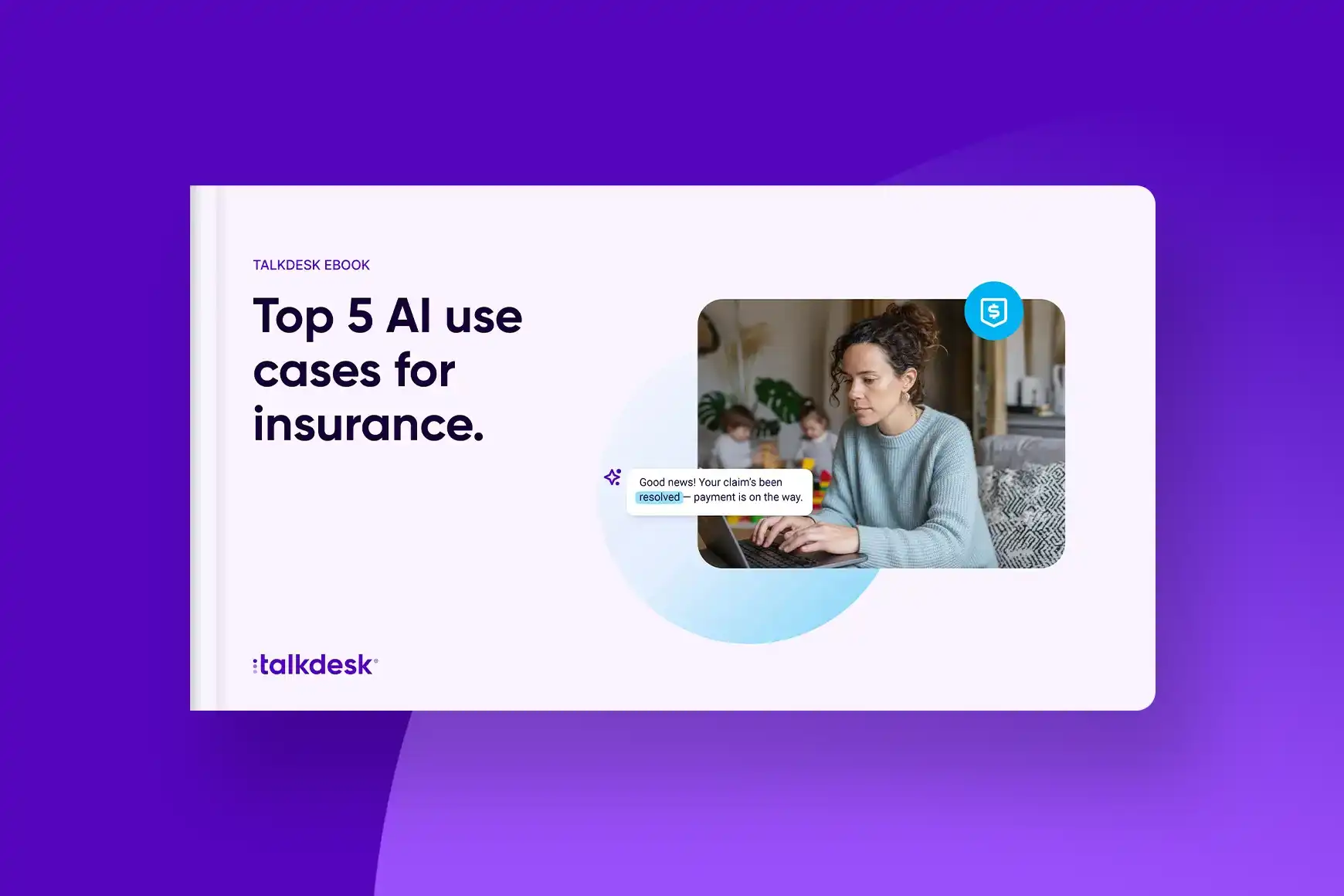AI agents for insurance: Redefining efficiency, experience, and scale

By Rahul Kumar
0 min read

Insurance has never been short on responsibility, but it’s running short on time. Claim volumes are rising, compliance rules are more complex, and customer expectations have shifted to always on. Legacy infrastructures, once a source of control, are now barriers to progress. Every manual handoff and outdated workflow widens the gap between what insurers want to deliver and what they can actually deliver.
For years, the industry’s answer has been to modernize one process at a time: automate intake, digitize documents, improve portals. However, these incremental fixes often add more layers to the existing complexity, resulting in a patchwork of technology that can’t move as fast as the market it serves. More than efficiency, the challenge is adaptability and building operations that can flex under pressure, scale intelligently, and respond to customers with the same immediacy they expect everywhere else.
Insurers are transforming the foundation of how the work gets done. The goal is to connect every part of the business into a single, responsive system capable of thinking and acting in real time. AI agents for insurance transform the industry’s pursuit of automation into intelligent multi-agent orchestration, delivering efficiency, accuracy, and consistency at scale.
The cost of fragmentation.
Behind most policies and claims lies a complex network of systems, teams, and checkpoints that can make it challenging to operate as a cohesive unit. Data lives in silos, manual processes bridge gaps that technology should close, and each claim that moves through this labyrinth gathers delay, cost, and risk along the way. For many insurers, the patchwork has become the process. Many have made significant investments to modernize their technology, but they’ve also introduced layers of complexity, resulting in an infrastructure that can become rigid and costly to maintain.
This fragmentation has a price as longer cycle times push claim costs higher and make compliance difficult to maintain. More importantly, the lack of coordination breaks consistency: two customers with identical losses can have vastly different experiences depending on where and how their data flows.
The industry’s progress isn’t slowed by a lack of effort, but by fragmentation. To move forward, insurers need more than automation in pieces; they need orchestration across the entire policy and claims lifecycle, where every action is informed, aligned, and accountable. AI agents for insurance make that happen.

EBOOK
Discover how AI is reshaping the policyholder journey and unlocking new possibilities for efficiency, engagement, and satisfaction.
From automation to orchestration.
Historically, insurers turned to business process automation as the solution to rising complexity, digitizing intake forms, scripting workflows, and modernizing claims systems. These initiatives brought incremental gains, but also new layers of tools, integrations, and oversight. What was meant to simplify operations often made them harder to manage. The real limitation isn’t automation itself, but isolation, because automating individual steps in a process doesn’t guarantee the process works better as a whole. A claim that moves smoothly through one system can still stall when it reaches the next. Data handoffs remain fragile, decisions stay inconsistent, and human expertise is called in to stitch everything together.
The next phase of transformation is different. Instead of task-oriented automation, it uses intelligent orchestration where systems, data, and people coordinate multi-step actions simultaneously rather than sequentially. Orchestration means every part of the policyholder lifecycle —policy servicing, claims, renewals—can share context in real time. Tasks can be routed dynamically, decisions guided by data, and AI agents for insurance automatically execute actions across channels and systems. When orchestration connects the dots across once-fragmented processes, insurers unlock something automation alone couldn’t: speed, accuracy, and control at scale.
Redefining efficiency at scale.
Efficiency means doing the same work faster, but the pressures insurers face today, such as rising claim volumes, volatile events, and escalating compliance demands, require something more adaptive. Efficiency is no longer defined by pace, but by precision.
When processes are intelligently orchestrated, efficiency stops being an isolated gain and becomes a shared capability. Claims intake, coverage validation, adjudication, and payment can all move through a connected flow where data transfers automatically, decisions are taken in real time, and tasks are routed to the right resource, human or AI, based on complexity and capacity. This end-to-end coordination eliminates redundant effort, reduces rework, and cuts cycle times without sacrificing accuracy or control. What once depended on manual follow-up and exception handling now runs with precision at scale.
The impact is measurable: lower cost per claim, faster resolutions, and greater capacity for adjusters to focus on the cases that demand expertise.
AI agents for insurance empower employees and policyholders.
Technology only creates value when it elevates people. In insurance, that means giving employees the intelligence and tools to focus on the moments that matter most, and ensuring every interaction is handled with speed, accuracy, and care. AI agents for insurance make that possible. Built on agentic AI and multi-agent orchestration, they handle the repetitive, rule-based tasks that slow down adjusters and service teams, from data entry and verification to summarization and follow-up. They provide real-time insights, next-best actions, and contextual guidance, helping every employee make faster, more confident, and compliant decisions.
For policyholders, the impact is immediate. Routine policy changes, payments, or claim updates can be resolved through self-service, 24/7. When an issue requires human expertise, context flows seamlessly between AI and humans with no need to restate information.
Insurers are seeking the same balance: how to modernize without compromising the discipline and trust that define this industry. That balance will come from a new way of working that unites intelligence, people, and process into a single connected operation. That’s what Talkdesk AI agents for insurance are built to enable. In addition to an evolution in technology, they shift how insurers think about scale, agility, and human potential.
If you’re ready to see how intelligent automation can reshape efficiency, experience, and trust across your operations, discover how Talkdesk Financial Services Experience Cloud for Insurance can help you build it.

AI agents for insurance FAQs.
Find answers to the most common questions about AI agents for insurance below.
AI Agents for Insurance are intelligent, purpose-built AI agents that automate and orchestrate complex insurance workflows—from claims intake and policy servicing to adjudication and compliance. Pre-integrated with core insurance platforms and trained on industry data, these autonomous agents execute with speed, accuracy, and precision. They can operate independently or collaborate with other AI or human agents through multi-agent orchestration to complete multi-step workflows, continuously learning and improving over time. Built-in guardrails ensure safety, transparency, and compliance through human oversight, auditability, and automatic PII redaction.
Talkdesk AI agents for insurance improve operational efficiency by delivering human-like self-service, real-time employee assistance, and intelligent workflow automation in a single platform that’s easy to deploy, secure, and governed by built-in guardrails. Autopilot handles high-volume policy and claims requests with natural, empathetic interactions, reducing call volume and wait times. Copilot and Knowledge AI empower employees with real-time guidance and compliance support, while specialized AI agents orchestrate complex workflows like FNOL intake, claims validation, and policy updates across core systems such as Guidewire and Duck Creek—accelerating resolution, improving accuracy, and scaling operations efficiently.
AI Agents for Insurance support compliance and risk management through an enterprise-grade orchestration layer that embeds governance, security, and oversight into every workflow. Built-in biometric and multi-factor authentication protect customer data, while automated documentation, audit trails, and policy-based guardrails ensure every action is transparent, traceable, and aligned with regulatory standards. AI-driven risk scoring continuously monitors inbound calls and live interactions to detect potential fraud or compliance issues in real time. Integrated access to policy and compliance knowledge sources enables scalable, automated enforcement, while real-time employee assistance helps human agents stay compliant during complex interactions. Automated quality management and process standardization further enhance accuracy, consistency, and accountability across both human and AI-driven operations.
As margin pressure intensifies and competition grows, insurers must find new ways to drive operational efficiency while delivering differentiated customer experiences that build loyalty and growth. These goals once stood in tension—efficiency often came at the expense of experience. Talkdesk AI Agents for Insurance change that equation. They bring intelligent automation and multi-agent orchestration together to connect data, people, and processes across the insurance lifecycle, enabling insurers to operate with greater speed, accuracy, and empathy — achieving efficiency and experience, together.





